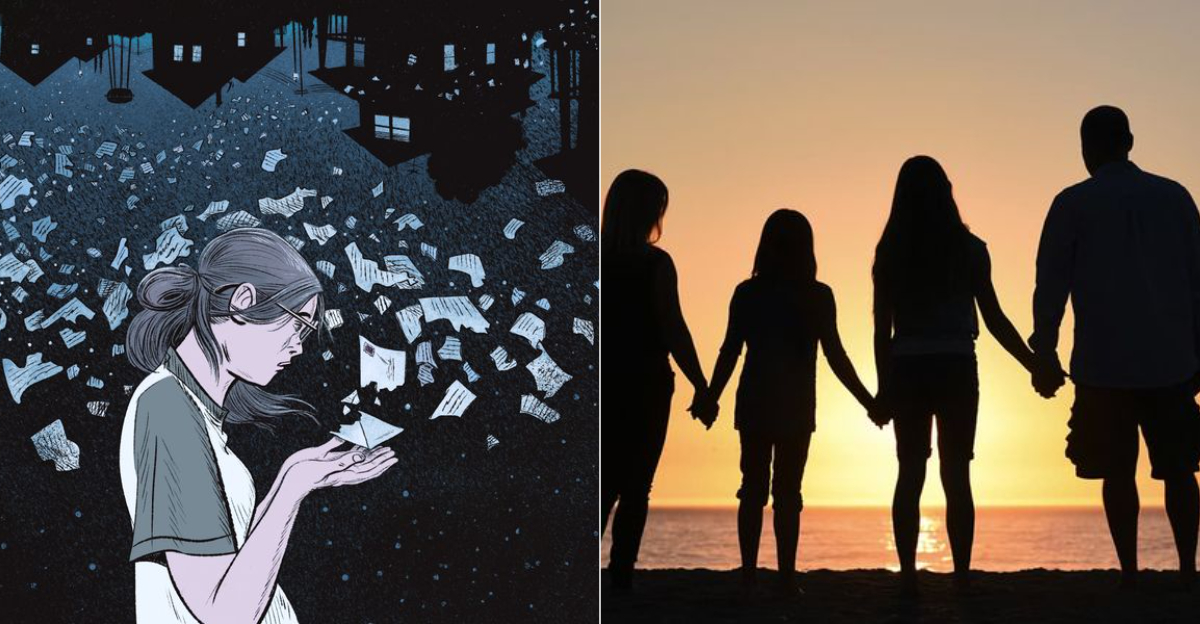15 Signs An Adult Child May No Longer Love Their Parents
You ever feel that ache deep in your chest—the one that creeps in when the room goes still, and suddenly you know something’s changed? Yeah, that one. That’s what it’s like when you feel your grown kid slipping away. Not just off to college for the weekend. I mean really pulling back. Like… gone-gone.
And here’s the part nobody likes to say out loud: maybe the love didn’t grow with them. Maybe somewhere between bedtime stories and slammed doors, the connection thinned out.
I’m not pointing fingers—this isn’t about blame. It’s about getting real. About seeing the thing for what it is, even when it stings sharper than the silence ever did. Because once you see it clearly, you get to decide what to do next. And that’s where the power kicks in.
1. Decreased Communication

Ever notice how the buzz of your phone starts to mean less and less? When your adult child used to call just to talk about nothing, and now even a holiday text feels rare. That silence echoes louder than any argument.
Some parents try to fill the gap with extra messages or funny memes—hoping for a reply that never comes. Others grow quiet themselves, afraid to seem needy or pushy, so conversations shrink to practicalities: reminders, logistics, maybe an obligatory birthday wish.
The hurt isn’t just in the missing words. It’s in the realization that the lines you used to keep open, out of habit or hope, are now mostly closed. You start to ask yourself if you even know what’s going on in their life anymore—or if you’re just someone saved in their contacts.
2. Avoidance of Family Gatherings

Remember those chaotic family dinners when everyone talked over each other? Now, their absence is the loudest voice at the table. They send a text about work or a last-minute emergency, and you don’t know what’s real anymore.
It’s not just the big events—a missed Thanksgiving, a skipped birthday. Even small get-togethers take on new meaning. You notice their chair, the stories they’d tell, the way they’d laugh at old jokes, and realize how much emptier the room feels.
The excuses pile up until eventually, they stop bothering to invent reasons at all. You find yourself setting an extra place at the table, not out of hope, but out of habit. Each gathering becomes a reminder of the deepening space between you.
3. 3. Distancia emocional

There’s something unmistakable about the way a conversation turns cold. You ask how they’re doing, and the answers get shorter, vaguer. It’s not about being busy, it’s about being elsewhere, emotionally.
Even when they’re physically present, it feels like talking through glass. You try to joke or reminisce, but the spark never lands. Sometimes, you wonder if they’re holding back anger or just don’t care enough to share.
You replay old times when laughter came easy, and silence didn’t feel like rejection. Now, every exchange is careful, measured. You start to question if you’re the only one missing what once was, or if they’re already somewhere you can’t reach.
4. Lack of Involvement in Family Decisions

Once upon a time, you consulted them about everything—vacations, big purchases, even what color to paint the hallway. Now, they don’t ask, don’t offer, and barely react to news about the family.
When it comes to decisions that affect everyone, they’re nowhere to be found. Maybe you try looping them in with group texts or emails, but replies barely trickle in. You start to make choices alone and tell yourself it’s just easier this way.
The hardest part isn’t the logistics, it’s realizing they don’t see themselves as part of the team anymore. You wonder what happened to that sense of belonging—when did they stop wanting a say in what happens to the family?
5. Negative Talk About Parents

Ever overhear your own name dropped in a story that doesn’t sound like the life you lived? Sometimes, it’s a friend who passes along the gossip. Other times, you catch a stray comment on social media.
Your child’s words feel sharp—sarcasm, criticism, or outright blame. They tell stories where you’re the villain, the reason things went wrong. It’s unsettling to realize the portrait they paint isn’t the parent you thought you were.
You want to defend yourself, but the distance makes it impossible. So you sit with the sting, wondering if this is how they make sense of their own pain, or if they stopped caring how those words land at all.
6. Physical Distance

People say distance makes the heart grow fonder, but sometimes it’s just an easier way to stay away. Your child takes a job in another state, or moves cities with barely a backward glance.
Meetups become rare, visits feel more like obligations than reunions. You tell yourself it’s normal for kids to move out, but you sense this is about more than chasing opportunities—it’s about building a life that doesn’t include you.
The airport goodbyes get easier for them, harder for you. You watch them slip away into new routines and new circles, and you realize the miles weren’t just practical—they were emotional, too.
7. Refusal to Discuss Relationship Issues

Every family hits rocky ground, but some refuse to even walk the path together. You try to bring up the past or ask if things can get better. They shut down, change the subject, or leave the room entirely.
You replay the little conflicts—what was said, what wasn’t—and realize you’re the only one willing to talk things through. Their body language becomes a wall and attempts at repair turn into arguments or, worse, cold silence.
You start to wonder if they’d rather keep the rift than risk the vulnerability of an honest conversation. The door remains closed, no matter how gently you knock.
8. Formation of New Support Networks

Remember when you were their first call in a crisis? Now, you hear about big moments—good or bad—secondhand, or not at all. Their “family” looks different these days and you’re not on the guest list.
They form close bonds with friends, colleagues, or even in-laws. You see photos of their holidays and milestones, surrounded by people who know their inside jokes, but you only get the highlights, if anything. It stings to see them build belonging elsewhere.
You hope those circles bring them comfort, but you can’t help but wonder: did you stop being a safe place, or did they just outgrow you? Either way, you’re left outside to peer in.
9. Limited Sharing of Personal Information

Those days when your child called to share every detail—from work drama to first dates—feel like another lifetime. Now, conversations skim the surface and avoid anything real or raw.
You ask how they’re doing, and get a “fine.” You mention a change in their voice and they brush it off. Even small talk has a script—safe, polite, and painfully impersonal.
You try not to pry, but you can’t shake the sense that you’ve become just another acquaintance. The stories you used to hear firsthand now come filtered, if at all. The distance isn’t just in the facts, it’s in the trust that’s quietly slipped away.
10. Increased Criticism or Judgment

Ever feel like you can’t do anything right? Suddenly, every choice—from your cooking to your politics—becomes a point of contention. The judgments are sharper now, and they rarely give you the benefit of the doubt.
Disagreements escalate quickly and it seems like they search for reasons to be upset. Even when you try to explain yourself, it’s met with an eye-roll or a sigh, not understanding.
You wonder when the roles switched—when your child became your harshest critic. The warmth that once defined your relationship is buried under a pile of grievances, and you’re left tiptoeing through every conversation.
11. Avoidance of Physical Affection

Some love languages don’t need words, but their absence says everything. Your child dodges hugs, shrinks from kisses on the cheek, and sits just a little too far away on the couch.
You remember when they’d crawl into your lap, or lean on your shoulder watching TV. Now, even casual touch feels awkward—like there’s a barrier neither of you can cross.
At first, you wonder if it’s just awkwardness or growing up, but deep down, you sense a colder truth: they don’t want to be held by you anymore and you don’t know how to ask why.
12. Reluctance to Include Parents in Major Life Events

You see the announcements online before you hear them directly. There’s a big move, a major promotion, or maybe even an engagement—and you find out with everyone else, or sometimes not at all.
They plan parties, ceremonies, and big life events, but your invitation feels like an afterthought. Maybe you’re asked to come, but you don’t get a seat at the table. You watch from the sidelines and smile for photos but you’re never really included.
There’s a pain in realizing you’re just another guest in their story, not the main character. You want to celebrate their wins, but it’s hard when you’re held at arm’s length.
13. Frequent Arguments Over Minor Issues

It’s always something—who left the lights on, why the mail wasn’t picked up, or why dinner is late. Small annoyances blow up into full-blown arguments more often than you’d like to admit.
You used to brush off these little things, but now it’s as if every disagreement is weighted. You both come armed for battle, ready with grievances that go far beyond the surface.
You realize it’s not really about the mess or the meal. Underneath, there’s resentment, maybe even grief. The trivial fights are just safer to have than the real, messy ones about love, loyalty, or loss.
14. Dismissal of Parents’ Advice or Opinions

You offer advice, not because you think you know best, but because you care. But somewhere along the way, your words started to mean less. They nod politely or change the subject, but never really listen.
It feels like your insight is irrelevant, your experience outdated. Even when you try to help, they take it as criticism or interference. You want to be useful, but are left feeling obsolete.
You start to question whether your presence in their life still matters. When your guidance is dismissed out of hand, the gap between you grows wider. It leaves you unsure of your role as a parent.
15. Comparisons to Other Parents

Nothing stings quite like hearing your child talk about how someone else’s parents “get it right.” They drop hints, make comparisons, or outright say they wish things had been different.
You hear about generous in-laws, fun family trips, or mothers who always listen. It’s hard not to tally up your perceived failures and wonder if you could have done things differently. Their words turn old wounds into open questions you can’t answer anymore.
Now and then, you try to explain or defend, but it only seems to make things worse. You’re left to stand outside and watch them celebrate bonds you wish you still shared.







